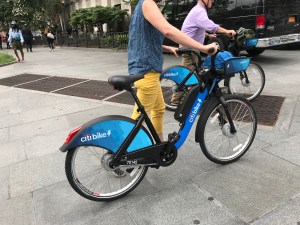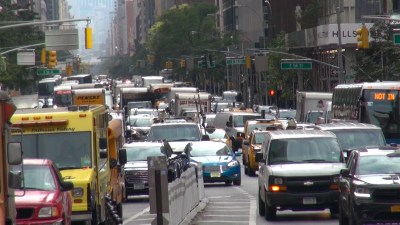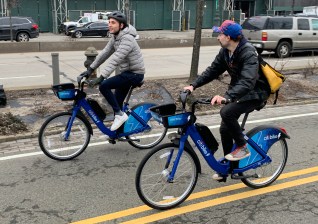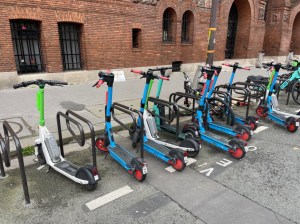New State Law Would Make Electric Citi Bike Hit-And-Runs a Felony
Liz Krueger wants the punishment to match the penalty for those committed by motorists.
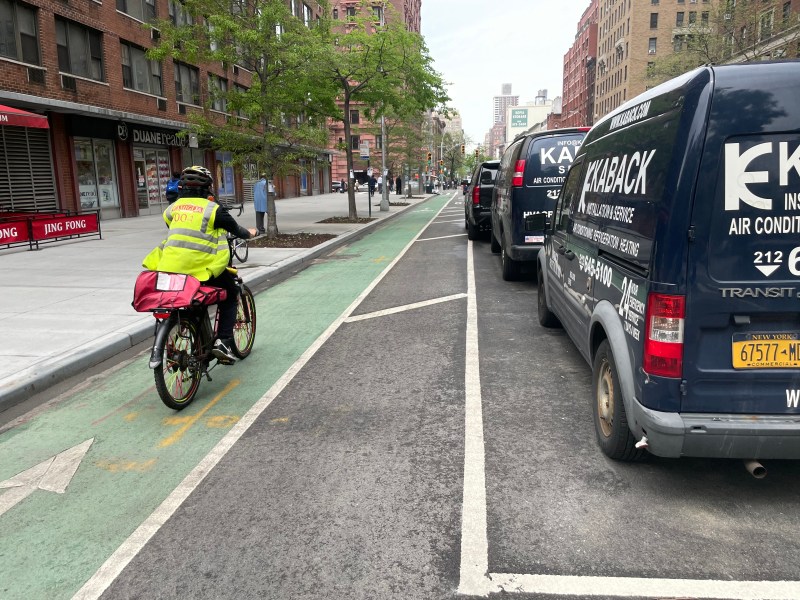
A new bill proposed by an Upper East Side lawmaker would make it a felony for electric-vehicle riders to crash into someone and leave the scene—including pedal-assist Citi Bike riders.
State Sen. Liz Krueger — who was an early and steadfast opponent of legalizing electric two-wheelers — told Streetsblog that her goal is to make the punishment for hit-and-runs on all e-bicycles and e-scooters match the penalty for those committed behind the wheel of a car.
Krueger’s bill, which was first reported by The Post, comes weeks after the high-profile death of actor Lisa Banes (“Gone Girl”), who was killed after she was struck by a hit-and-run moped user who allegedly had run a red light on Amsterdam Avenue.
Krueger’s collegaue, State Sen. Brad Hoylman, who represents the Upper West Side, introduced a similar bill last month to hike the penalties for hit-and-runs involving electric scooters. Hoylman said that his legislation does not include Citi Bike’s pedal-assist bikes.
“Nothing is being criminalized in this bill. The act of hitting someone, and running, that is the crime — not the riding of the vehicle,” Krueger told Streetsblog on Wednesday. “It’s not making the penalty match the product; it’s making the penalty match damage done to a person.”
The state legalized e-bikes last year, and breaks them down into three different classifications: Class 1 includes pedal-assist bikes, such as Citi Bike e-bikes, which max out at 20 miles per hour; Class 2 includes throttle-powered bikes that max out at 20 miles per hour; and Class 3 includes e-bikes that are throttle-powered and max out at 25 miles per hour in cities of one million people or more — they are the bikes mostly used by delivery workers, who were the subject of a years-long crackdown.
Krueger’s bill would upgrade charges for electric scooters, such as Lime and Revel, and all three classifications of e-bike riders who flee the scene of a crash causing serious physical injury or death from what’s now a misdemeanor to a Class E felony — the lowest felony in New York, which carries a maximum of four years in prison. It would raise the penalties for e-scooter and e-bike riders who flee the scene of a injury-causing crash from a violation to a misdemeanor. The new charges would be on par with those for motorists who flee the scene of fatal or serious-injury-causing crashes although, as Streetsblog has reported, hit-and-run drivers are rarely caught or charged.
Krueger says her main impetus for the bill is to crack down on the faster, larger scooters and mopeds and illegal ATVs, which she says terrorize the streets of her district.
“It sends a message that no matter what kind of vehicle you’re on on the streets of NYC, you have to be careful … the Lime and Revels, and anybody else’s electric scooters that look like small motorcycles or mopeds. They look like off -road vehicles from farm country that are now ubiquitous in Manhattan and folks driving down avenues, often late at night, and doing wheelies,” she said. “I get complaints from legislators all over the five boroughs that large groups are careening though neighborhoods, and they can certainly do damage if they hit you, or another vehicle.”
But lumping Citi Bike’s pedal-assist bikes, which are capped at 18 miles per hour, together with faster, throttle-powered bikes and electric scooters would be a mistake, according to the bike-share company, which is owned by Lyft.
“We’re confused by the inclusion of pedal-assist ebikes when they have generally the same crash rate as our ‘classic’ bikes,” said Caroline Samponaro, head of transit, bike and scooter policy at Lyft. “The number of annual cycling trips has increased significantly since the launch of Citi Bike, coinciding with a drop in the number of cyclists killed or severely injured in our service area, even as e-bikes now make up approximately 40 percent of our rides.”
Citi Bike’s pedal-assist bikes are just as safe as regular bikes, data show.
Last fall, the Department of Transportation said that Revel scooters have caused 69 times as many deaths per million trips since launching in 2018 than Citi Bike has since 2013,
Still, Krueger defended her bill to Streetsblog.
“It is not okay to do harm to someone and then simply bike away from incident,” she said.
Drivers in multi-ton vehicles such as cars and trucks have caused exponentially more bodily harm than those on electric two-wheels — motorists have killed at least 137 people on city streets so far this year, the most fatalities since 2013, when 135 died in traffic violence over the same time period. E-bike riders have killed only two people so far this year, and just one pedestrian in 2020.
But from the start of their presence on city streets, e-bikers have been the target of criminalization and crackdowns, despite their relative harmlessness when compared to drivers, as Streetsblog has reported. The state finally legalized e-bikes in 2020, but disdain for their riders remains, including on the Upper West Side, where a local community board is demanding they be barred from protected bike lanes, and on the Hudson River Greenway, where e-bike and e-scooter riders are banned from one of the world’s busiest bike routes — a move that reportedly came at the behest of both Krueger and Hoylman.
Much of the problem with the city’s deadly roadways is not a lack of laws, but a lack of space for those on two-wheels and on scooters — especially as the number of people biking climbs. The solution to crashes is proper, safe infrastructure for cyclists and drivers.
Krueger said she is in favor of expanding bike lanes and improving bike infrastructure, but she said that specific proposals, such as widening the busy pathways on First and Second Avenues, need more time and research to justify them.
“It’s not an ‘instead of,’ it’s both, we need lots of things — the reality is changing on our streets. My bill is not an instead of all these other things, or solves all these things, but if you’re riding a vehicle and injure someone when you hit them, you should not be able to simply walk away from the situation,” she said. “I support all ideas that make sense, and you have to look at each proposal separately. What I can’t support is say there’s no place for [motor] vehicles in NYC.”
Marco Conner DiAquoi, the deputy director of Transportation Alternatives, said that the bills distract from the deaths caused by drivers.
“In a year where car drivers have killed and injured several thousand New Yorkers, including dozens in hit-and-runs, legislators should be laser-focused on preventing further carnage by multi-ton machines on our streets,” he told Streetsblog. “Hit-and-runs are wrong and leaving a victim behind is a cowardly act. But the right solution is not creating new felony penalties that only address extremely rare incidents by small scooters and ebikes, and which have not been proven to work.”
